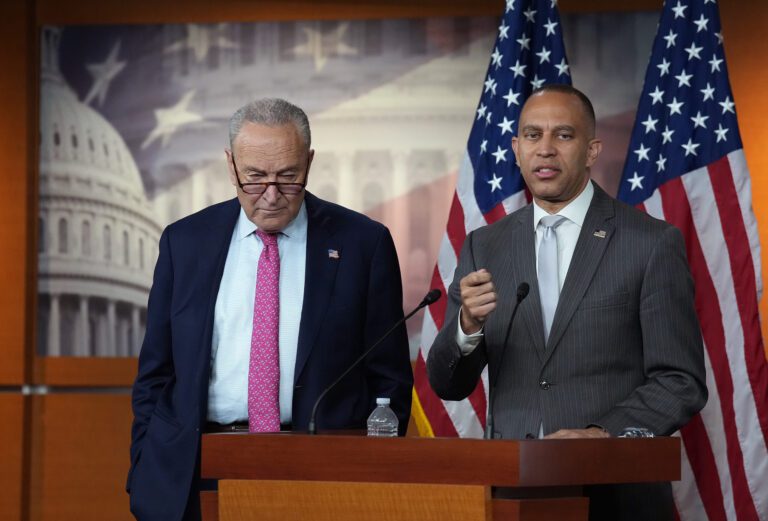Government Funding Showdown: Schumer and Jeffries Stand Firm as Trump Withdraws
The ongoing debate over government funding is heating up as Senate Majority Leader Chuck Schumer and House Minority Leader Hakeem Jeffries refuse to back down on their demands. Despite their efforts to engage with former President Donald Trump, he canceled a scheduled meeting, deeming their proposals "unserious."
House Republicans Pass Short-Term Spending Bill
On Friday, House Republicans advanced a continuing resolution aimed at keeping the government operational until November 21. However, this proposal was met with resistance in the Senate, where it failed to secure the necessary 60 votes for passage. All Democrats, except for Senator John Fetterman, voted against the bill.
Key Proposals by Senate Democrats
In response, Schumer presented a counteroffer that proposed:
- Making certain health insurance subsidies permanent.
- Limiting the president’s unilateral power to cut funding.
Despite these modifications, Trump has made it clear that he is unwilling to entertain such proposals.
Trump’s Position on Funding and Medicaid
In a lengthy post on Truth Social, Trump expressed skepticism about the viability of discussions with Schumer and Jeffries. He accused them of threatening a government shutdown over "unreasonable demands," which he claims include:
- $1 trillion in new spending aimed at sustaining healthcare for undocumented immigrants.
- Coverage concerns regarding Medicaid for deceased individuals.
The "$1 trillion" figure Trump cited references Medicaid funding changes in the One Big Beautiful Bill passed earlier this year, which Democrats are currently seeking to reverse.
Trump’s Take on Accountability
Trump argued that “there are consequences to losing Elections” and suggested that Democrats have lost their way. He emphasized:
“The Democrats in Congress seem to have totally lost their way. They obviously have no idea what it means to put America First.”
Response from Schumer and Jeffries
Undeterred, Schumer responded directly to Trump via social media:
“When you’re finished ranting, we can sit down and discuss health care.”
Both Schumer and Jeffries are adamant that they will not capitulate without concessions. Jeffries stated:
“Democrats do not support the partisan Republican spending bill because it continues to gut the healthcare of the American people.”
Context of the Spending Bill
Speaker Mike Johnson backed Trump, accusing Schumer and his colleagues of pushing for a full repeal of the Medicaid reforms included in the previous legislation. He warned that such actions would lead to a massive spending increase, amounting to $1.5 trillion.
Potential for Future Negotiations
Despite the rancor, Trump indicated he would consider meeting with the Democratic leaders again if they come to the table “serious about the future of our Nation.” He said:
“We must keep the Government open, and legislate like true Patriots rather than hold American Citizens hostage.”
Senate Democrats Navigate a Delicate Situation
Senate Democrats have been cautious as they navigate this fraught spending battle. The recent unveiling of a funding proposal revealed a split among party members, with a number of Democratic senators refusing to comment publicly on the matter.
The Rescission Issue
A significant sticking point is Trump’s potential use of rescissions, a process that allows the president to cut funding along party lines after a bipartisan vote. Senator Chris Coons, a Democrat on the Appropriations Committee, stated he would not support government funding if the rescissions issue remains unresolved:
“If they continue in those efforts, I won’t support keeping the government open.”
Conclusion: The Ball Is in the Democrats’ Court
As Congress grapples with these funding challenges, the coming weeks are critical. Both Schumer and Jeffries have asserted their commitment to negotiating in good faith. However, with Trump’s steadfast opposition to their proposals, the future of government funding remains uncertain.
For timely updates on this situation, visit sources like NPR and The Washington Post.


